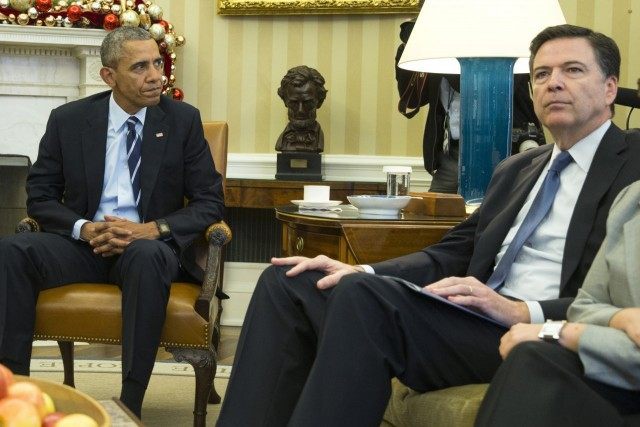The president charges that the Obama administration conducted surveillance on Trump Tower during the 2016 campaign. His critics charge him with making baseless accusations.
Bernie Sanders labeled Trump’s claim “delusional,” a Politico article by Bradley Moss calls the notion “preposterous,” and Al Franken dubbed it “ridiculous.” John McCain reentered the fray over the weekend, opining, “The president has one of two choices, either retract, or to provide the information that the American people deserve.”
Put another way, either Barack Obama snooped or he didn’t snoop. President Trump releasing Foreign Intelligence Surveillance Act court requests may go a long way toward proving or disproving his claim. While forthcoming information may substantiate or invalidate Trump’s specific accusation, the general notion that presidents, particularly Democratic presidents, remain above abusing the security apparatus to violate civil liberties of private citizens ranks as, if not delusional, preposterous, and ridiculous, at least slightly naïve.
If Barack Obama spied on a political enemy under the guise of spying on a foreign enemy, he finds himself in bad company. Contrary to the “shocked, shocked” reactions, presidents other than Richard Nixon abused power to abuse political enemies—and violate the civil liberties of strangers.
President Woodrow Wilson signed the Alien Act, the Sedition Act, Espionage Act, and the Trading with the Enemy Act, which empowered the federal government to send socialist leader Eugene Debs to prison for opposing the draft, to revoke the postal privileges of the American Socialist, the New York Call, and other left-wing publications, and to deport sundry radicals, most notably on the famous “Soviet Ark.” Although the president’s prejudices recently sparked a reorientation of his legacy among race-conscious liberals, his vindictive use of federal power to punish adversaries goes barely mentioned.
President Franklin Roosevelt, over the objections of “Mr. Republican” Robert Taft, instituted an internment and relocation program for those of Japanese, German, and Italian descent in America. The Korematsu decision, in which six justices—five appointed to the court and the sixth appointed as chief justice by the 32nd president—upheld Roosevelt’s 1942 executive order barring Americans of Japanese-Americans, including the Oakland-born Fred Korematsu, from residing on the West Coast. The order and decision regularly receive condemnation from Democrats decades after the fact. In real time, Democrats devised, praised, and upheld the constitutionality of the policy.
President John F. Kennedy’s administration launched a federal invasion of Martin Luther King’s privacy that ended only with the minister’s death. The president’s brother, Attorney General Robert Kennedy, authorized wiretaps and bugs to glean personal information about King. The president, himself a man of great appetites, shared stories of King’s sexual interests, including allegedly attempting to organize a sex party coinciding with 1963’s March on Washington, with intimates. The prying says more about the Kennedys than King. But historians don’t say much about the role of the eavesdroppers. Taylor Branch, for instance, maintains that J. Edgar Hoover “manipulated” the Brothers Kennedy into hounding the civil-rights leader. This popular narrative imagines that the FBI director ordered around the president and the attorney general rather than the reverse.
So many policies decried as infringements on civil liberties by today’s Democrats came into existence because yesterday’s Democrats regarded them as enlightened. The Palmer Raids and the McCarran Act got their names from a progressive Democrat and a conservative Democrat, respectively. Samuel Dickstein, the congressman whose resolution launched the House Committee on Un-American Activities (HCUA), actually served as a paid agent of the Soviet Union. Republicans controlled the House, and its controversial committee, in just four of the 36 years of the much-maligned HCUA’s existence.
Democrats jailed Eugene Debs, forcibly relocated Fred Korematsu and barred Joe DiMaggio’s fisherman-father from his profession, and authorized the bugs that mined the most personal details from Martin Luther King’s private life.
But trust them. They don’t do such things any longer.

COMMENTS
Please let us know if you're having issues with commenting.